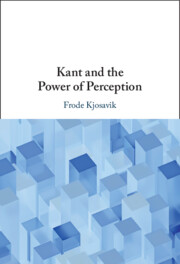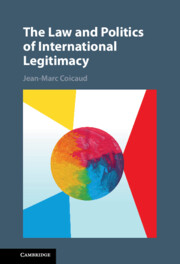Refine search
Actions for selected content:
137 results
Chapter 5 - Manifolds of Intuition and Perspectival Transformation
-
- Book:
- Kant and the Power of Perception
- Published online:
- 27 November 2025
- Print publication:
- 11 December 2025, pp 161-190
-
- Chapter
- Export citation
Chapter 2 - Perceptual Reference and Discrimination
-
- Book:
- Kant and the Power of Perception
- Published online:
- 27 November 2025
- Print publication:
- 11 December 2025, pp 51-89
-
- Chapter
- Export citation

Kant and the Power of Perception
-
- Published online:
- 27 November 2025
- Print publication:
- 11 December 2025
Chapter 6 - Varieties of Cognition
- from Part II - A Kantian Account of Thought Experiment
-
- Book:
- Kierkegaard and the Structure of Imagination
- Published online:
- 26 September 2025
- Print publication:
- 16 October 2025, pp 89-106
-
- Chapter
- Export citation
7 - The Sign of His Presence
- from Part II - A Sign for This Generation: Reading the Gospels with Origen
-
- Book:
- The Life of Jesus in the Writings of Origen of Alexandria
- Published online:
- 26 September 2025
- Print publication:
- 16 October 2025, pp 142-167
-
- Chapter
- Export citation
2 - ThePowerofReason
-
- Book:
- Kant's Metaphysics of the Will
- Published online:
- 06 November 2025
- Print publication:
- 09 October 2025, pp 27-54
-
- Chapter
- Export citation
Stolen Valor: How the Humanities “@ Work” Are Hidden in Plain Sight
- Part of
-
- Journal:
- Public Humanities / Volume 1 / 2025
- Published online by Cambridge University Press:
- 08 October 2025, e142
-
- Article
-
- You have access
- Open access
- HTML
- Export citation
4 - Adolf Reinach, Negation, and Law
- from Part I - Reinach and His Method
-
-
- Book:
- Reinach and the Foundations of Private Law
- Published online:
- 20 July 2025
- Print publication:
- 07 August 2025, pp 106-122
-
- Chapter
-
- You have access
- Open access
- HTML
- Export citation
6 - Implications for Political Legitimacy and the Theory of Legitimacy
- from Part II - Political Legitimacy and Theory of Politics
-
- Book:
- The Law and Politics of International Legitimacy
- Published online:
- 14 July 2025
- Print publication:
- 24 July 2025, pp 92-98
-
- Chapter
- Export citation
3 - The Legitimacy–Law Nexus
- from Part I - Setting the Stage
-
- Book:
- The Law and Politics of International Legitimacy
- Published online:
- 14 July 2025
- Print publication:
- 24 July 2025, pp 39-46
-
- Chapter
- Export citation
3 - Normative Legitimacy of Iran’s Capital Drug Law and Its Application
- from Part I - Executing States
-
-
- Book:
- Capital Drug Laws in Asia
- Published online:
- 07 August 2025
- Print publication:
- 24 July 2025, pp 53-82
-
- Chapter
- Export citation
5 - Political Legitimacy as Evaluation and Judgment
- from Part II - Political Legitimacy and Theory of Politics
-
- Book:
- The Law and Politics of International Legitimacy
- Published online:
- 14 July 2025
- Print publication:
- 24 July 2025, pp 68-91
-
- Chapter
- Export citation

The Law and Politics of International Legitimacy
-
- Published online:
- 14 July 2025
- Print publication:
- 24 July 2025
Chapter 7 - Belief, Judgment, and Knowledge
-
- Book:
- Explaining our Actions
- Published online:
- 17 April 2025
- Print publication:
- 08 May 2025, pp 135-157
-
- Chapter
- Export citation
Chapter 4 - Mental Actions
-
- Book:
- Explaining our Actions
- Published online:
- 17 April 2025
- Print publication:
- 08 May 2025, pp 70-90
-
- Chapter
- Export citation
4 - Judging in Conflict
-
- Book:
- Political Theology and the Conflicts of Democracy
- Published online:
- 21 March 2025
- Print publication:
- 03 April 2025, pp 206-279
-
- Chapter
- Export citation
Scale matters: risk perception, return expectations, and investment propensity under different scalings
-
- Journal:
- Experimental Economics / Volume 22 / Issue 1 / 15 March 2019
- Published online by Cambridge University Press:
- 14 March 2025, pp. 76-100
-
- Article
-
- You have access
- Open access
- HTML
- Export citation
Conclusion
-
- Book:
- Judges, Judging, and Judgment
- Published online:
- 03 January 2025
- Print publication:
- 16 January 2025, pp 201-206
-
- Chapter
- Export citation
Accentuation explains the difference between choice and rejection better than compatibility: A commentary on Chandrashekar et al. (2021)
-
- Journal:
- Judgment and Decision Making / Volume 20 / 2025
- Published online by Cambridge University Press:
- 16 January 2025, e1
-
- Article
-
- You have access
- Open access
- HTML
- Export citation
8 - Character, Wisdom, and Humility
-
- Book:
- Judges, Judging, and Judgment
- Published online:
- 03 January 2025
- Print publication:
- 16 January 2025, pp 174-200
-
- Chapter
- Export citation
